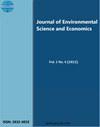The Butterfly Effect and its Implications for Resilience in Complex Socio-Ecological Systems
引用次数: 4
Abstract
This study delves into the intriguing concept of the Butterfly Effect and its implications for resilience in complex socio-ecological systems. Drawing upon chaos theory, the Butterfly Effect posits that minute initial changes can yield substantial and unforeseen outcomes in dynamic systems. The research investigates how the Butterfly Effect influences the resilience of intricate systems, such as urban ecosystems, global supply chains, and social networks, when confronted with environmental, economic, or social disruptions. By scrutinizing case studies and employing mathematical modeling, this study seeks to unveil the nonlinear dynamics, tipping points, and feedback loops that amplify or mitigate the effects of minor perturbations in complex systems. Moreover, it explores how comprehending the Butterfly Effect can inform strategies for augmenting the resilience of socio-ecological systems, including adaptive management, scenario planning, and community engagement. The study also explores the ethical and governance considerations arising from the unpredictability and interconnectedness inherent in complex systems. It highlights the need for inclusive decision-making processes that account for diverse perspectives and values. Additionally, it emphasizes the importance of adaptive governance approaches that allow for flexible responses to changing circumstances and evolving knowledge. By delving into the Butterfly Effect and its implications, this research endeavors to contribute to the development of strategies and policies that foster resilience in the face of uncertainty and promote sustainable development in complex socio-ecological systems. It recognizes the need for integrated approaches that consider the interdependencies and feedbacks between social, economic, and environmental dimensions. Ultimately, this study underscores the significance of understanding the Butterfly Effect as a lens through which to view and manage complex systems. By acknowledging the potential for cascading effects from minor changes, decision-makers and practitioners can adopt proactive measures to enhance system resilience. This research calls for further exploration of the Butterfly Effect across different scales and contexts to better grasp its implications and potential applications. In conclusion, the Butterfly Effect serves as a powerful concept for understanding the dynamics of complex socio-ecological systems. This research contributes to the existing body of knowledge by shedding light on its implications for resilience and providing guidance for decision-making and policy development in an uncertain and interconnected world.蝴蝶效应及其对复杂社会生态系统恢复力的影响
本研究深入探讨了蝴蝶效应的有趣概念及其对复杂社会生态系统中恢复力的影响。根据混沌理论,蝴蝶效应假设微小的初始变化可以在动态系统中产生实质性的和不可预见的结果。该研究调查了蝴蝶效应如何影响复杂系统(如城市生态系统、全球供应链和社会网络)在面临环境、经济或社会破坏时的恢复能力。通过仔细研究案例和采用数学建模,本研究试图揭示非线性动力学、临界点和反馈回路,这些非线性动力学、临界点和反馈回路放大或减轻了复杂系统中微小扰动的影响。此外,本文还探讨了蝴蝶效应如何为增强社会生态系统弹性的策略提供信息,包括适应性管理、情景规划和社区参与。该研究还探讨了复杂系统中固有的不可预测性和相互关联性所引起的伦理和治理考虑。它强调需要包容性的决策过程,考虑到不同的观点和价值观。此外,它强调了适应性治理方法的重要性,这种方法允许灵活地响应不断变化的环境和不断发展的知识。通过深入研究蝴蝶效应及其影响,本研究旨在为制定应对不确定性的策略和政策做出贡献,并促进复杂社会生态系统的可持续发展。它认识到需要采取综合办法,考虑到社会、经济和环境各方面之间的相互依存关系和反馈。最后,这项研究强调了理解蝴蝶效应的重要性,通过它来观察和管理复杂的系统。通过承认微小变化的潜在级联效应,决策者和从业者可以采取主动措施来增强系统的弹性。本研究需要进一步探索不同尺度和背景下的蝴蝶效应,以更好地掌握其含义和潜在应用。总之,蝴蝶效应是理解复杂社会生态系统动力学的一个强有力的概念。这项研究通过阐明其对复原力的影响,并为不确定和相互联系的世界中的决策和政策制定提供指导,从而有助于现有知识体系。
本文章由计算机程序翻译,如有差异,请以英文原文为准。
求助全文
约1分钟内获得全文
求助全文
来源期刊

Journal of Environmental Science and Economics
Environmental Economics-
自引率
0.00%
发文量
0
期刊介绍:
Journal of environmental science and economics (JESCAE), ISSN: 2832-6032 is an open access peer-reviewed journal that considers articles and reviews articles on all aspects of environmental economics.
Aim and Scope
Journal of Environmental Science and Economics is an international scholarly refereed research journal that aims to promote the theory and practice of environmental economics, Sustainability research, technological innovation, and economics. A broad outline of the journal''s scope includes; peer-reviewed original research articles, case, and technical reports, reviews and analyses papers, short communications and notes to the editor, in interdisciplinary information on the practice and status of research in environmental science, sustainability, technological innovations, and economics.
The main aspects of research areas include, but are not limited to; Environmental pollution control and abatement technology, Sustainable and economic Development, sustainable consumption and Sustainability, Environmental and sustainability assessment, transport and fate of pollutants in the environment, concentrations and dispersion of wastes in air, water, and non-point sources pollution, atmospheric pollutants and trace gases, environmental impact assessment, industrial ecology, ecological and human risk assessment; improved energy management and auditing efficiency and environmental standards and criteria.
 求助内容:
求助内容: 应助结果提醒方式:
应助结果提醒方式:


